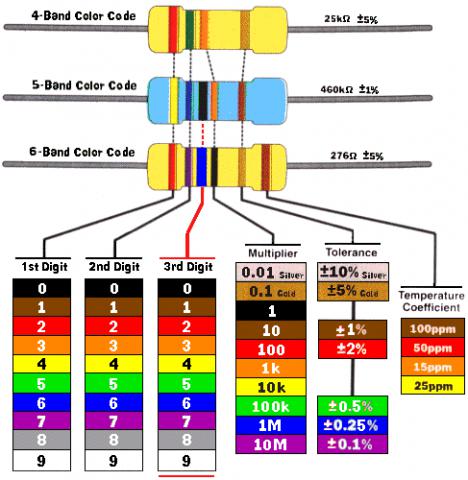The Resistor F.A.Q
Resistors are a very important part of a Circuit. We all know that every little bit counts! So.. here's as much as you should need to know about Resistors that I know. (Mind you, I'm still learning; and in fact this is helping me to learn. Hope other's find help here!)
What's the Schematic Symbol for a Resistor?

What's the Code for all The Colored Strips on a Resistor?

Here's two Free Resistor Code Apps for help:
Electronics Assistant V4.31 & Resistor Color Coder 2.1
How can you tell, just by looking at a resistor what 'brand' it is? Or Can you?
Knowing the 'BRAND' of the Resistor isn't necessary. I would like to hear experienced Techs own loyalties on this however! So, what's the best BRAND of resistors in your opinion? (If someone Can, please do tell!)
How can you tell what 'KIND' of Resistor A resistor is? Is it a Carbon Composition, Carbon Film, Metal film, Metal oxide Or wire wound?
Metal Film:
http://www.resistorguide.com/metal-film-resistor/


I found these worth their read: http://electronics.stackexchange.com...nd-what-values
https://learn.sparkfun.com/tutorials/resistors/all
How do I know what Wattage the resistor is that I'm replacing?
The Schematics give Voltage (V) to the Resistor and you know the Resistor's Ohm Value (From color codes). So.. after you Find Current (I) (from I= V/R) then you find P (wattage) = V(squared)/R


Here's a Quote from Mariushm (BadCaps Veteran):
"Usually, [the] white/cream resistors are carbon film, blueish/green resistors used to be metallic , carbon film resistors usually have lousy temperature coefficient and larger tolerance (5-10%) High wattage resistors are wirewound usually (let's say 1w or higher).
Power dissipated in a resistor is calculated by formula IxIxR where i = current and r=resistor value and generally the recommendations are to not exceed about 70-80% of the resistor's wattage rating. 1w resistors are quite large. When in doubt, you can go with 0.5w resistors or 1w resistors instead of 0.125w or 0.25w resistors.
Here's some other Resources (on Wattage):
http://techtalk.parts-express.com/sh...wattage-rating
http://www.robogaia.com/how-to-calcu...r-wattage.html
On Resistors:
http://www.mikroe.com/old/books/keu/01.htm
What is the Electronic Industries Association (EIA) 'Preferred Values' for Resistors?
Easiest Answer is to give you this site link:
http://www.logwell.com/tech/componen...or_values.html
Any additional information that is relevant will be greatly appreciated. Please add to this Museum of Needed Electronics Information! Namaste- <><
Attached Thumbnails
Resistors are a very important part of a Circuit. We all know that every little bit counts! So.. here's as much as you should need to know about Resistors that I know. (Mind you, I'm still learning; and in fact this is helping me to learn. Hope other's find help here!)
What's the Schematic Symbol for a Resistor?
What's the Code for all The Colored Strips on a Resistor?
Here's two Free Resistor Code Apps for help:
Electronics Assistant V4.31 & Resistor Color Coder 2.1
How can you tell, just by looking at a resistor what 'brand' it is? Or Can you?
Knowing the 'BRAND' of the Resistor isn't necessary. I would like to hear experienced Techs own loyalties on this however! So, what's the best BRAND of resistors in your opinion? (If someone Can, please do tell!)
How can you tell what 'KIND' of Resistor A resistor is? Is it a Carbon Composition, Carbon Film, Metal film, Metal oxide Or wire wound?
Metal Film:
http://www.resistorguide.com/metal-film-resistor/
I found these worth their read: http://electronics.stackexchange.com...nd-what-values
https://learn.sparkfun.com/tutorials/resistors/all
How do I know what Wattage the resistor is that I'm replacing?
The Schematics give Voltage (V) to the Resistor and you know the Resistor's Ohm Value (From color codes). So.. after you Find Current (I) (from I= V/R) then you find P (wattage) = V(squared)/R
Here's a Quote from Mariushm (BadCaps Veteran):
"Usually, [the] white/cream resistors are carbon film, blueish/green resistors used to be metallic , carbon film resistors usually have lousy temperature coefficient and larger tolerance (5-10%) High wattage resistors are wirewound usually (let's say 1w or higher).
Power dissipated in a resistor is calculated by formula IxIxR where i = current and r=resistor value and generally the recommendations are to not exceed about 70-80% of the resistor's wattage rating. 1w resistors are quite large. When in doubt, you can go with 0.5w resistors or 1w resistors instead of 0.125w or 0.25w resistors.
Here's some other Resources (on Wattage):
http://techtalk.parts-express.com/sh...wattage-rating
http://www.robogaia.com/how-to-calcu...r-wattage.html
On Resistors:
http://www.mikroe.com/old/books/keu/01.htm
What is the Electronic Industries Association (EIA) 'Preferred Values' for Resistors?
Easiest Answer is to give you this site link:
http://www.logwell.com/tech/componen...or_values.html
Any additional information that is relevant will be greatly appreciated. Please add to this Museum of Needed Electronics Information! Namaste- <><
Attached Thumbnails



Comment